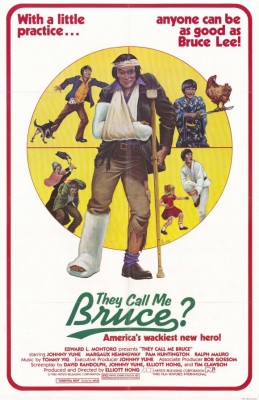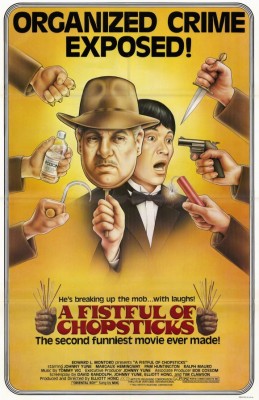| Reviews & Columns |
|
Reviews DVD TV on DVD Blu-ray 4K UHD International DVDs In Theaters Reviews by Studio Video Games Features Collector Series DVDs Easter Egg Database Interviews DVD Talk Radio Feature Articles Columns Anime Talk DVD Savant Horror DVDs The M.O.D. Squad Art House HD Talk Silent DVD
|
DVD Talk Forum |
|
|
| Resources |
|
DVD Price Search Customer Service #'s RCE Info Links |
|
Columns
|
|
|
They Call Me Bruce
That's pretty much the level of humor in They Call Me Bruce (1982), a sorta parody of '70s martial arts movies, with Korean-American nightclub comedian Johnny Yune the unwitting bagman for broadly stereotyped Mafioso. It's a curiously innocuous film - on one level this cut-rate comedy is miserably bad, with terrible jokes outnumbering the good ones by about 20 to 1, yet like its main character it's also so naïve and eager to please that it's hard to entirely dislike.
Liberation Entertainment's DVD is uncut and in 16:9 enhanced widescreen (unlike Madacy's DVD from April 2003), but the transfer is well below par and rife with edge-enhancement and combing that distracts from the fun.
Chinese immigrant Won (Yune) is a cook working for L.A.-based Italian gangsters, who call him "Bruce" because of his "uncanny" resemblance to the late Bruce Lee. (Actor Yune does not resemble Lee at all, but never mind.) When feds seem to be getting the upper hand on the gangsters - the agents have taken to disguising themselves as Hare Krishnas and have picked up some impressive martial arts skills - the gangsters decide to make Bruce their stooge, dispatching him on a cross-country trip with sackfuls of cocaine hidden in what Bruce thinks is a special Chinese flour.
Bruce and Mafia sycophant Freddy (Raf Mauro), acting as chauffer, gradually make their way across America, with government agents following their every move and an ambitious mob-princess type, Karmen (Margaux Hemingway), also tailing them, hoping to steal the coke and take over the Mob's West Coast operations.
They Call Me Bruce - not They Call Me Bruce?; the question mark was only on the posters - leaves no comedy mainstay unturned. It's the movie equivalent of a stand-up comedian joking about bad airline food and mothers-in-law. The scattershot approach covers an amazing amount of ground in just 86 minutes: redneck sheriffs, The Godfather, James Bond, cowboys, TV's Wonder Woman, camera-crazy Japanese tourists, Rocky, myriad television commercials, Saturday Night Fever, TV's Kung Fu. Some of the references undoubtedly will be lost on younger viewers. In one scene Bruce's martial arts instructor (John Fujioka) encourages him to try and punch a hole in the wall.
"I'm not going to try it - you try it!" Bruce says.
"I'm not going to try it; I'm the master."
"I know," says Bruce, "Let's ask Mikey! [pointing to the Master's assistant] He'll try anything."
The film is crammed with one-liners: "I'm a sex object. Every time I ask girls [for] sex they object!" In another scene Bruce explains that he once worked in a massage parlor but was fired "for rubbing customers the wrong way."
Most of the comedy is pretty lame - Bruce's dying grandfather (also Yune) says, "Money is not the most important thing in life. The most important thing in life is...broads!" - but funny ideas pepper the film throughout, like making Fujioka's martial arts master extol the virtues of patience and control one minute, losing his temper and screaming into a telephone the next. Fans of the film will be happy to hear that a brief nude scene has been restored; it features one of the better gags, which I won't give away here.
Yune (b. 1945), who co-wrote the script, is oddly likeable, with Bruce unfazed by all the racial slurs all the bad guys (including his employers) continuously sling in his direction. Bruce remains cheerful and undaunted, a perennial underdog one can't help but root for, no matter the film pretty much stinks.*
The only "name" in the cast is the tragic supermodel-turned-actress Hemingway, who committed suicide in 1996. In this she's reminiscent of Lizabeth Scott, but her role here is, strangely, utterly inconsequential to the story; it's a shame Hemingway, unlike her more famous sister, never really had the chance to show what she was capable of.
They Call Me Bruce probably couldn't be made today on account of all the broad racial/religious/nationality stereotypes. Ironically, like the exotic "Oriental" of Hollywood movies from the 1920s and '30s, Yune's character is a jumble of Chinese, Hong Kongese, and Japanese iconography, but not specifically Korean (where are the kimchi jokes?), probably because Korean culture was less-known to general audiences back in 1982 than it is today. The film couldn't have cost more than $2 million to make, and probably considerably less than that, yet grossed $16.9 million, this in spite of extremely spotty distribution. (Its success also inspired a sequel, They Still Call Me Bruce, starring, written, and directed by Yune.)
Video & Audio
Billed as a "25th Anniversary Edition" - two years too late - They Call Me Bruce is presented in 16:9 enhanced widescreen but the image has a distracting degree of edge-enhancement and combing, most noticeable during the opening titles, the Las Vegas exteriors, and other long shots. Though the box touts a "high quality transfer from a recently found pristine 35mm print" (why not source the original negative?) the image is flaccid and on the soft side, and has a few missing frames, scratches and other wear-related damage here and there. Still, it doesn't look all that different from what I remember seeing back in 1982. Though disappointing, for what it is the transfer is watchable, just unimpressive. The 2.0 Dolby Digital mono is okay; there are no subtitle or alternate audio options, and no Extra Features.
Parting Thoughts
If you're a fan of Bruce Lee knock-off movies, genre parodies, and cheap independent comedies, They Call Me Bruce might appeal to you. It's a pretty feeble film, but on the other hand I must admit that after a single viewing 27 years ago, I still remembered many of its one-liners. Rent It.
* I saw the film once before, in 1982, with high school friend Kathy Moan, who for reasons totally unfathomable to me actually wanted to see it. We had the same reaction back then: a crummy little movie, yet curiously likeable.
Film historian Stuart Galbraith IV's latest book, Japanese Cinema, is on sale now.
|
| Popular Reviews |
| Sponsored Links |
|
|
| Sponsored Links |
|
|
| Release List | Reviews | Shop | Newsletter | Forum | DVD Giveaways | Blu-Ray | Advertise |
|
Copyright 2024 DVDTalk.com All Rights Reserved. Legal Info, Privacy Policy, Terms of Use,
Manage Preferences,
Your Privacy Choices | |||||||















